On the high seas again to Raiatea and Tahaa - (61)

|
Having read about the island, we decided to anchor just near
the Hibiscus Pension. The reason being that they are also a turtle sanctuary. Instead of anchoring, we picked up a mooring buoy and then
went ashore to check out the hotel. We were met by the owner Leo, a very nice
man who speaks a little English and German as well as French. He has
flags from just about every nation in the world hanging up in his restaurant,
Roger was impressed (and surprised) at the size of the Welsh flag he had been
given. We had seen the turtles, in their pens, as we walked
along the pontoon and one of them looked really sorry for himself.
Normally, Leo buys the turtles from the fishermen who
catch them in their fishing traps. They cost 5000 Xpf’s each. The
alternative is that they will end up in a pot!!!! He works alongside an
American university in Apia, Samoa. He tags all the turtles released so that
they can be tracked. Since he started 15 years ago, Leo has released some 1500
turtles. Anyway he asked if I would like to release one of the other
turtles in the morning ( I suspect the cost will cover the price he paid), so
we’ll see what happens. We asked him if he had any information on things to see, he
disappeared and came back telling us that a car would be picking us up in 10
minutes to visit the Vanilla Plantation. Brian turned up, as promised, 10 mins later in his
landrover. He is another ex- French foreign Legionnaire, which is
astounding. We had never met one in our lives and now we have met 2 within the
space of a couple of months. Brian, like Alex in Hiva Oa, married a Polynesian. Her
family owned a huge plantation, which had run down when her brother didn’t
want to take over. So Brian and his wife rescued some of the plants and set
about re-establishing the plantation. That was 15 years ago. Now they have a
thriving plantation, known as La Vallee de Vanille. They have 11 acres, or 2500 trees, that’s how a
plantation is measured here. For those of you who don’t know, Tahitian Vanilla is
the finest in the world and it is very hard to buy, except here in
Polynesia,unlike Madagascan vanilla. You could go to the galleries Lafayette in Paris if
you were desperate though. But the cost is phenomenal. A kilo
costs 2000 Euros in France (I know you wouldn’t buy a kilo) and he sells
it here for 200 Euros a kilo, and he has to pay for the airfare too!! It is the
first time we have actually seen the Fair Trade issues up close. Vanilla comes from a particular orchid. Apparently there are
something like 35000 hybrids of orchid, but only one will give you Vanilla.
After 2 years, god willing, it will flower. Now,
because they don’t have the insects necessary to pollinate the orchids
here in Tahiti, they have to perform a task called Marrying the flower. Between 7am and 11am (it is too hot after that) , they open
the flower so that they can see the stamen with the pollen I think it’s
the stamen, but it could be the pastille??), they take a little stick and push
the stamen up to the male part of the flower and squeeze gentle with their
thumb, this is Marrying.
By the next day they can tell whether it has worked or not,
as the flower starts to die and the little stalk starts to fatten (this becomes
the vanilla pod). Now, you don’t go and marry all 15 flowers on a
branch, because if you did the branch would break under the weight and you would
lose the lot.
They are sorted in sizes. Broken pods, which may only be
misshapen, are set aside and will be made into paste, powder, jam or essence.
The green pods in the background are what they look like before they are dried.
When they are sufficiently dried then starts the
process of giving them the flavour and aroma we recognise, up until this point
they have little or no aroma. So every day for the next 15 days each individual pod is
massaged. This is so that the seeds release their flavour. This is why vanilla is so expensive, it takes 3 years from
planting to table. Plus for every 4 kilos of green pods, you only get 1
kilo of dried pods. But the great thing is that kept properly, these will keep
for 20 years!!! So the next time you have some ice cream made with real
Tahitian Vanilla, just remember what it took to get the vanilla to your plate!. Speaking of plates, we went ashore to dine at l’
Hibiscus. We had a delicious 3 course meal and a bottle of wine for a little
over $100, which those of you who know French Polynesia know that is
reasonable, especially as it was so good. On the wall beside our table was a glass case with a Miss
Tahiti sash in it. I asked Leo whose it was and it turns out his daughter was
Miss Tahiti 2004. He proudly produced a scrap book with newspaper cuttings of
her success. She was absolutely stunning. The funny thing is that we saw
her when we went to the Miss Tahiti competition. As it was the 50th
anniversary, they had all the previous ( I was going to say old, but I thought
that was unkind) Miss Tahiti’s parading on stage too. Small world huh? |
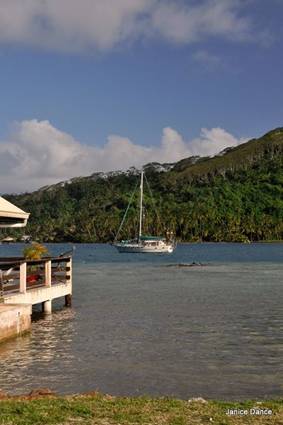 We sailed across
to Raiatea, the weather was atrocious, strong winds and rain greeted us. It was
so miserable, that we stayed only one night before upping anchor and heading
over to neighbouring Tahaa.
We sailed across
to Raiatea, the weather was atrocious, strong winds and rain greeted us. It was
so miserable, that we stayed only one night before upping anchor and heading
over to neighbouring Tahaa.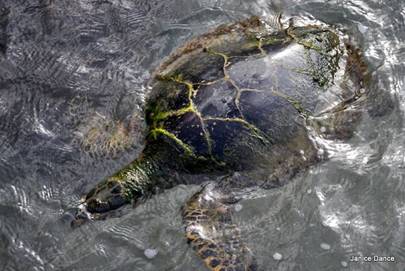 Leo explained
that it had only been brought in yesterday and so they are trying antibiotics.
Leo explained
that it had only been brought in yesterday and so they are trying antibiotics.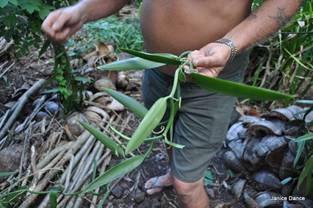 So they plant a
particular type of tree, which is easy to maintain and gives a straight
trunk, good shade and when pruned will not grow any taller.
So they plant a
particular type of tree, which is easy to maintain and gives a straight
trunk, good shade and when pruned will not grow any taller.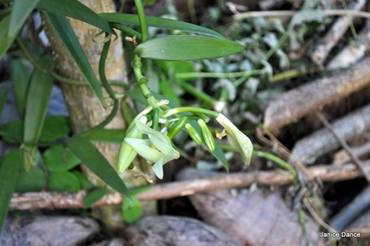 At the Base of
the tree they take a piece of the orchid, about 10 inches long and lay it along
the ground. They then cover it with coconut husks. It takes root and grows into
the husk, which absorbs rain, so provides a constant source of moisture.
At the Base of
the tree they take a piece of the orchid, about 10 inches long and lay it along
the ground. They then cover it with coconut husks. It takes root and grows into
the husk, which absorbs rain, so provides a constant source of moisture. 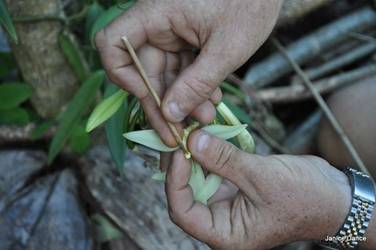
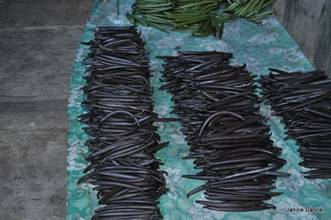 9 months later
you have a branch full of pods. You have to then cut the whole branch and start
the drying process. As the pods dry they fall off the branch naturally without
breaking the pod. The drying takes a very long time. For several weeks, they
are laid out in the sun for a couple of hours a day. Then they are wrapped in
muslin and placed in freezers that are switched off, so that they keep them
warm and dry instead of cold and wet.
9 months later
you have a branch full of pods. You have to then cut the whole branch and start
the drying process. As the pods dry they fall off the branch naturally without
breaking the pod. The drying takes a very long time. For several weeks, they
are laid out in the sun for a couple of hours a day. Then they are wrapped in
muslin and placed in freezers that are switched off, so that they keep them
warm and dry instead of cold and wet.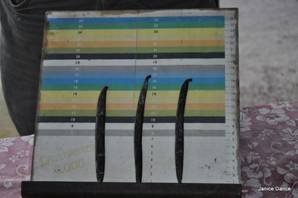 The others
are then taken and further dried.
The others
are then taken and further dried.